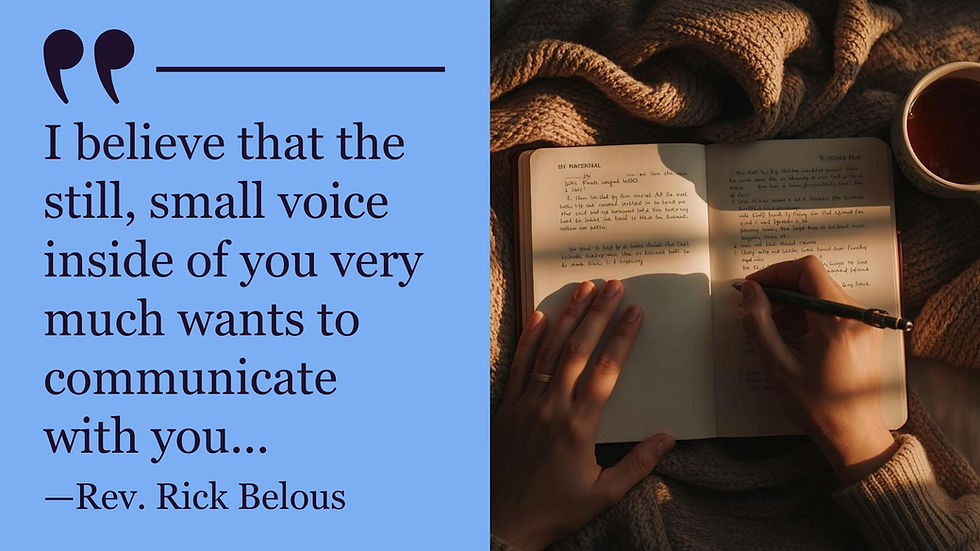Can We All Get Along?
- Rev. James Trapp

- Sep 9, 2019
- 4 min read

“Can we all get along?” is a famous line spoken by Rodney King in a press conference following the Los Angeles uprising in 1992. King, an African-American resident of LA, was violently arrested by officers from the local police department. The event was videotaped by a bystander who happened to have a video camera (this was before our current era of cell phone cameras everywhere). The police officers were charged with excessive force. Despite what appeared to be overwhelming evidence of their guilt, the jury acquitted the officers. This prompted the uprising, hundreds of injuries, and prompted Rodney King to go on TV and plea, “Can we all get along?” I thought about those words while I was participating in the “Pause for Peace” initiative sponsored by Sister Vedanti, Director of the Brahman Kumaris in Africa. At the event, which took place at the Unitarian Universalists of Sacramento, Vedanti shared the basis for true peace.
A dear friend who is a close follower of world and current events asked me, “Do you believe peace on the planet is truly possible?” He was reflecting on the violence that had been taking place not only in this country, but around the world. It’s a fair question to ask. It seems like an impossible challenge to solve. Where do we begin? What can we do? Perhaps the answer lies in these words:
“Let there be peace on earth and let it begin with me.”
Those words, from Jill Jackson’s “Peace Song” and echoed by Sister Vedanti in her talk, contain the essence of what is needed to attain peace in our communities and on our planet. As we look at our external world and see the conflicts and acts of brutality, it’s easy to conclude that peace on earth is an airy-fairy pipedream that is beyond human attainment. Yet, upon close examination we discover that the lack of peace we see in our communities and our world is merely a reflection of our collective beliefs. That is to say, what manifests in the world is the byproduct of our consciousness.
If we are to have the peace that our souls long for and desire, we must each look in the mirror and begin with ourselves. We may believe that our individual consciousness is not connected to, and has no bearing on, the lack of peace on the planet. Yet, there is an axiom that says “As within, so without.” If we are to manifest change in outer experiences, it has to start with our consciousness. This requires that our thoughts, words and actions be in alignment with, and accord to, the qualities of peace. When enough of us radiate the energy and vibration of peace, there will be a correspondent demonstration of peace in the external world because we are being the peace that we want to see. We will weave ourselves into, and be an integral part of, our community organizations, our schools, and our governments and be the leaders and beacons of peace locally and globally.
It all begins with self-examination. We ask moment by moment: “Am I in any way harboring thoughts of hate or resentment or belief in separation?” If so, then we must recognize that we are contributing to an energy and consciousness that is blocking the flow of peace in the world. Dr. Martin Luther King, Jr. reminded us that peace will not come on the wheels of inevitability. Rather, peace must be a constant moment-by-moment choice. It must be intentional. If there is to be peace on earth, then we must individually and collectively choose peace, even when faced with its seeming opposite.
It comes down to what we practice. Regardless of our philosophical theology, our real theology is what we do. So we ask, “What do we do when faced with revenge? Or hate? Or the need to forgive?” If we have the lofty belief that one day we're going to forgive, then our theology is one day we'll forgive. One day we'll love. One day in the future we'll practice what we say we believe. That is not an empowering theology; it is a delay tactic of the unenlightened ego that keeps us inundated with the prevailing thoughts of the day and adds to the violent consciousness of the group soul.
For there to be peace, we must become peacemakers. A peacemaker does not see a world of separation where there is an “us vs. them” mentality. A peacemaker no longer sees from the limited perception of my family or my tribe or my country, right or wrong. Rather a peacemaker realizes that there is only one life, and that life is the life of God. All of humanity emanates from that one life.
Our world is hungering for peacemakers. It’s longing for us to become lights and instruments of the divine on earth and carry the consciousness of peace everywhere that we go. When we are the peacemakers we are destined to be, when we walk into any environment, it begins to exude peace because the essence of who we are is proclaiming: “Let there be peace on earth and let it begin with me.” When enough people embody the peacemaker consciousness, the answer to Rodney King’s question, “Can we all get along?” will be a resounding yes.
Peace & Blessings,
James





